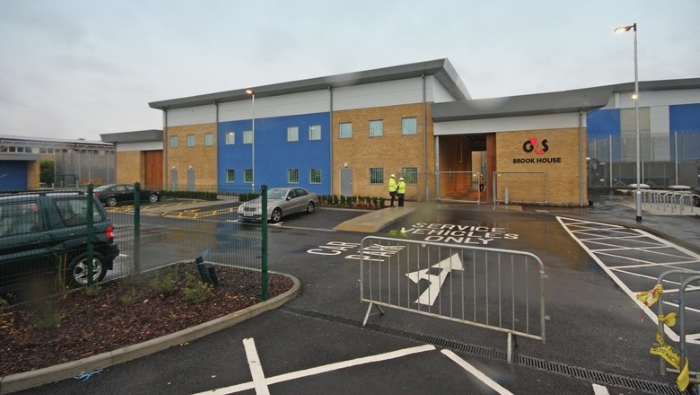A public inquiry into a migrant removal centre found a toxic culture with detainees forcibly moved while naked and some subjected to unnecessary pain.
It found migrants at Brook House, near Gatwick Airport, were subjected to degrading treatment and to racist and derogatory language by staff.
The inquiry was triggered by a BBC Panorama investigation in 2017.
Home Secretary Suella Braverman said the Home Office will “carefully consider the findings” of the inquiry.
Inquiry chair Kate Eves recommended that the government change the law to limit detention at such centres.
Ms Eves called for a 28-day time limit for holding detainees.
There is currently no maximum period detainees can be held while they wait to be deported or fight for asylum.
WATCH: Physical abuse in Brook House immigration centre
The Brook House Inquiry Report found it to be a place of “stress and distress”.
The inquiry identified 19 instances over a five-month period that amounted to mistreatment contrary to Article 3 of the European Convention on Human Rights, which protects you from inhumane, degrading treatment or punishment.
The 19 instances of mistreatment identified by the inquiry included:
- Inappropriate use of force against 10 detainees
- Forcibly moving detainees while naked or near naked
- Unnecessary pain used on four detainees
- Dangerous restraint techniques used on four detainees
- Use of inappropriate and humiliating comments against two detainees during suicide attempts
- Homophobic comments against one detainee
- Initially failing to help a detainee after a suicide attempt
Ms Eves said: “Brook House was not sufficiently decent, secure or caring for detained people or its staff at a time when these events took place.”
She said it was “entirely unsuitable for detaining people for anything other than a short period of time”.

The chair has made 33 recommendations which, if implemented, will ensure what happened at Brook House does not happen in the future and provide a more humane, compassionate and professional environment, the report said.
The report said that the indefinite nature of immigration detention caused “uncertainty and anxiety” for detained people, which was detrimental to their physical and mental wellbeing.
The centre was found to be overcrowded, dirty and noisy from aircraft at nearby Gatwick, while there were limited activities for detainees and prolific use of the so-called zombie drug Spice, with evidence custody officers were bringing it into the centre.
Some detainees are former foreign national criminals scheduled for deportation, while others are asylum seekers or people refused the right to remain in the UK.
Ms Eves’ report found staff had used inappropriate and dangerous force. In some incidents, teams of custody officers carried detainees naked and screaming through Brook House.
The report also found there was abusive and racist language used, including in two cases where detainees were trying to kill themselves.
‘Broken men’
The BBC began its investigation in 2016 when custody officer at Brook House, contacted Panorama.
He was encouraged by a BBC Panorama documentary aired that month about the abuse of teenage prisoners at Medway Secure Training Centre in Rochester, Kent.
He told the BBC that Brook House “was a pretty horrifying place to work”.

He added: “Abuse was rife. Self-harm was rife. Broken men at every turn.
“In the lead up to me wearing secret cameras in Brook House I witnessed countless instances of abuse and it was horrifying and it was really difficult for staff and obviously much more difficult for the detainees who were the victims of this abuse,” Mr Tully said.
The inquiry’s recommendation to limit detention in immigration removal centres may pose a significant challenge to the government.
Changes in the law as part of a ‘Get Tough’ policy on immigration make it more likely people who come to the UK in small boats will be detained.
The BBC has been investigating conditions inside immigration centres as the government takes a harder line on migrants. Documents shared with us show mounting strain on detainees.
The family of a Colombian man, Frank Ospina, who is believed to have killed himself at a Heathrow immigration removal centre, told the BBC that he begged for help and was willing to leave the UK.
The inquiry warned the government that a failure to act on previous recommendations was a “dark thread that runs through this report”.
The chair has urged the Home Office to respond within six months.
‘Safety and security’

Ms Braverman said she acknowledged the “failings in both oversight and governance to protect the welfare of detained individuals” at the centre
She told MPs in a written statement in the House of Commons that “significant improvements to immigration detention” had been made since the 2017 events.
Shadow immigration minister Stephen Kinnock said some of the evidence was “utterly harrowing” and showed the government had “delivered neither control or compassion”.
Brook House can house more than 500 men and has the same security as a Category B prison.
Since the documentary, figures released under the Freedom of Information Act show there have been 53 allegations of serious misconduct at Brook House, which may have resulted in disciplinary proceedings.
The Home Office would not say how many had been substantiated.
(Source: BBC)










